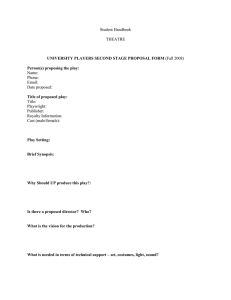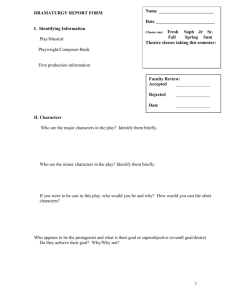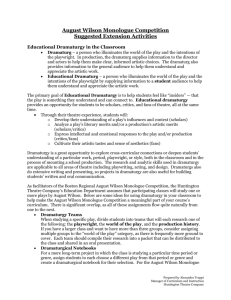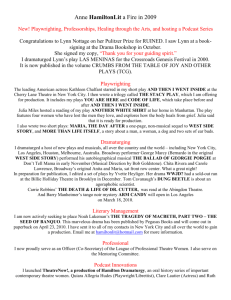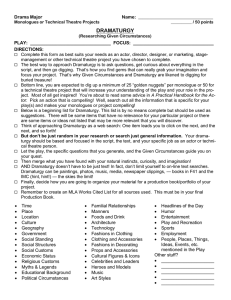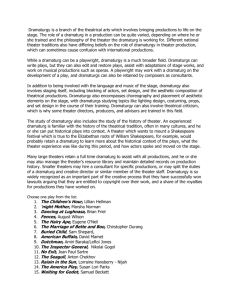Definitions of Terminology to Accompany Theatre Department Unit Criteria at... Stephan Golux
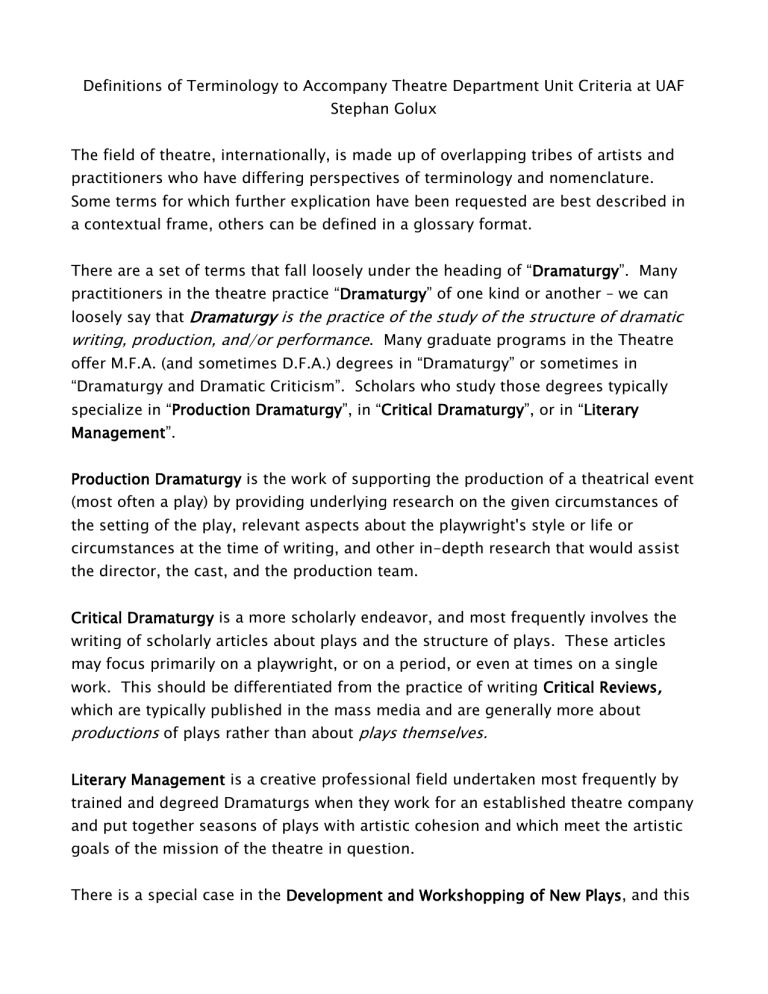
Definitions of Terminology to Accompany Theatre Department Unit Criteria at UAF
Stephan Golux
The field of theatre, internationally, is made up of overlapping tribes of artists and practitioners who have differing perspectives of terminology and nomenclature.
Some terms for which further explication have been requested are best described in a contextual frame, others can be defined in a glossary format.
There are a set of terms that fall loosely under the heading of “Dramaturgy”. Many practitioners in the theatre practice “Dramaturgy” of one kind or another – we can loosely say that Dramaturgy is the practice of the study of the structure of dramatic writing, production, and/or performance. Many graduate programs in the Theatre offer M.F.A. (and sometimes D.F.A.) degrees in “Dramaturgy” or sometimes in
“Dramaturgy and Dramatic Criticism”. Scholars who study those degrees typically specialize in “Production Dramaturgy”, in “Critical Dramaturgy”, or in “Literary
Management”.
Production Dramaturgy is the work of supporting the production of a theatrical event
(most often a play) by providing underlying research on the given circumstances of the setting of the play, relevant aspects about the playwright's style or life or circumstances at the time of writing, and other in-depth research that would assist the director, the cast, and the production team.
Critical Dramaturgy is a more scholarly endeavor, and most frequently involves the writing of scholarly articles about plays and the structure of plays. These articles may focus primarily on a playwright, or on a period, or even at times on a single work. This should be differentiated from the practice of writing Critical Reviews , which are typically published in the mass media and are generally more about productions of plays rather than about plays themselves.
Literary Management is a creative professional field undertaken most frequently by trained and degreed Dramaturgs when they work for an established theatre company and put together seasons of plays with artistic cohesion and which meet the artistic goals of the mission of the theatre in question.
There is a special case in the Development and Workshopping of New Plays, and this
might affect any dramaturgs or other theatre practitioners working in any of the above-mentioned endeavors. When a new play is written by a playwright, it is typically run through a vetting and developmental process that may be supported and buttressed by a Production Dramaturg. The Production Dramaturg in this setting will often serve not only as researcher, but also to advocate for the playwright and to advise the playwright on issues of structure. In this regard, a Production
Dramaturg may serve a role that is analogous to the role of line editor for a novelist.
In the Development and Workshopping of a New Play, the Director also takes on a role different than the role they would take in the mounting of an existing or classical play. Typically the Director and Dramaturg would be working to put on the play such that it most closely represents the artistry of the Playwright, but also so that it is most likely to met with positive response from the public and from the critical community. In Theatres whose mission it is to present and develop New
Plays, it is the role of Literary Management to solicit and vet submissions and new works from the broader community of Playwrights. Critical Reviewers will also take on the role in the mass media of reviewing and evaluating the play itself, in addition to the production.
In ending this section, let me say that the Development and Workshopping of New
Plays is a lengthy process. From the time the Playwright considers that they have created a script that they can submit for evaluation to the time the script gets a full production, there may be many months, sometimes more than two years, of informal and formal play readings, backers auditions, workshops (which are small-scale production that are protected from public critical review) and many many re-writes.
Throughout this process, the Director, the Production Dramaturg, and the Literary
Manager will be intimately involved with the Playwright.
* * * * * *
Theatre Anthropology is the scholarly and practical work of studying, learning, possibly assimilating, and disseminating information about theatrical and dramatic traditions that take place in different cultures. This is not necessarily an academic endeavor – in purely academic settings the appropriate subset of this work might be called Performance Studies.
Basic Performance Research is simply Basic (rather than Applied) research in performance techniques, undertaken in a studio laboratory setting.
Script Preparation is the process undertaken by Directors and/or Dramaturgs when beginning work on the production of a play. It involves research, planning, scheduling, the development of concept and artistic vernacular, and preparation necessary to engage in casting and in the collaborative design process.
Peer Reviews of Practice and Writing seems fairly self-explanatory – a review among those in the profession of the practical production work and the critical or analytic writing undertaken by others in the profession.... not sure how to better describe this!
Consulting can be understood, in a general sense, as it would in any field. When a production (or perhaps the development of a new play) is in trouble, or needs outside expertise or perspective, it is the work that is solicited and contracted to provide that expertise or perspective. In the theatre, this may include “scriptdoctoring”, and may also involve stepping in temporarily or permanently to take on some contracted aspect in a production which is being unsatisfactorily performed by the person originally hired.
Laban Notation is a language and notational system for interpreting, describing, visualizing and notating all movement. It is especially useful in the development, description, and archival of choreography. The name comes from the inventor,
Rudolf Laban.
